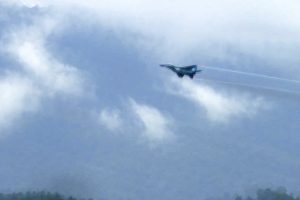Myanmar’s military junta has apologized to Thailand after one of its fighter jets briefly crossed into Thai airspace, on the same day that a senior Thai military delegation was paying court to the country’s generalissimo Senior Gen. Min Aung Hlaing.
“We already have good ties,” Thai Prime Minister Prayut Chan-o-cha told reporters today, adding that Myanmar’s military government had apologized for the incident. “Most importantly, we’re still capable to defend ourselves… It’s not a big deal.”
According to the Associated Press, the Royal Thai Air Force said that it dispatched two F-16 fighters to patrol the border area after receiving a report that an aircraft, possibly a MiG-29, had crossed into Thailand’s airspace while carrying out an attack in a territory of Myanmar’s Kayin State controlled by an ethnic armed group. The incident prompted officials to order the evacuation of villages and schools in the vicinity of the border.
The Air Force added that it had asked the military attaché at the Thai Embassy in Myanmar to convey a warning to Myanmar authorities and work with them to avoid similar incidents in the future, the AP reported.
Remarkably, the incident took place on the same day that Min Aung Hlaing met with a senior Thai military delegation in the capital Naypyidaw. A report in the state-owned Global New Light of Myanmar stated that the Thai delegation, led by Lt.-Gen. Apichet Suesat, traveled to Myanmar for the 34th meeting of the Thailand-Myanmar Regional Border Committee. In this capacity, the two sides “discussed and exchanged views on enhancing the existing friendship and cooperation between defense forces of the two countries,” including “stability in the border area.”
Among the other topics of discussion were the ongoing “political developments” in Myanmar and “security forces’ attempts for the eradication of terrorist incidents,” junta-speak for the military’s brute crackdowns on the new civilian militia groups and ethnic armed groups that have launched an armed uprising against its rule.
Since the coup, as the Myanmar military has been forced to defend its takeover on a growing number of fronts, it has employed increasing numbers of air strikes in border areas, creating a fresh humanitarian emergency in regions of Myanmar that have for decades produced refugee flows into Thailand.
According to a report released last month by the London-based advocacy group Amnesty International, the junta has launched air strikes and artillery attacks that have hit homes, health facilities, temples, and churches in Kayin and Kayah states. Amnesty found that air strikes had killed nine civilians and wounded at least nine others between December 2021 and March of this year.
The idea that a Myanmar fighter jet would stray into Thai territory on the very same day that officials from both sides met to discuss the very question of border cooperation is strange, to say the least. But regardless of whether it was intended, the incident functions as a reminder of the disruptive impacts that Myanmar’s internal turmoil is likely to have on Thailand, which has already seen tens of thousands of people flee across the border from the conflict zones of Kayin and Kayah states.
This makes it all the stranger that the Thai government has taken such a hands-off approach to the increasingly desperate conflict in Myanmar. Addressing last month’s IISS Shangri-La Dialogue in Singapore, Pornpimol Kanchanalak, who was appointed Thailand’s special envoy for Myanmar in April, warned that Western governments should not get “stuck in cancel rhetoric” when it comes to dealing with the military junta in Myanmar.
“Condemnations, sanctions, ostracisation … have reached diminishing returns,” she said.
The call for pragmatism is all very well, but such an approach by the Thai government, itself the civilianized version of a government that came to power in a military coup in 2014, has been no more successful in addressing Myanmar’s conflict. Nor has it succeeded in stemming the impacts that will continue to wash across the Thai border as long as the conflict continues.
It was perhaps no surprise, then, that today also brought a report that Thai authorities were preparing to forcibly return a political refugee, a leader of the anti-junta Civil Disobedience Movement, to Myanmar.
































